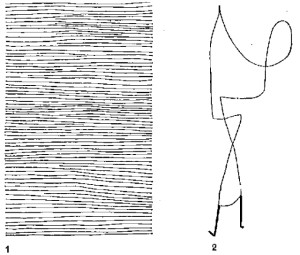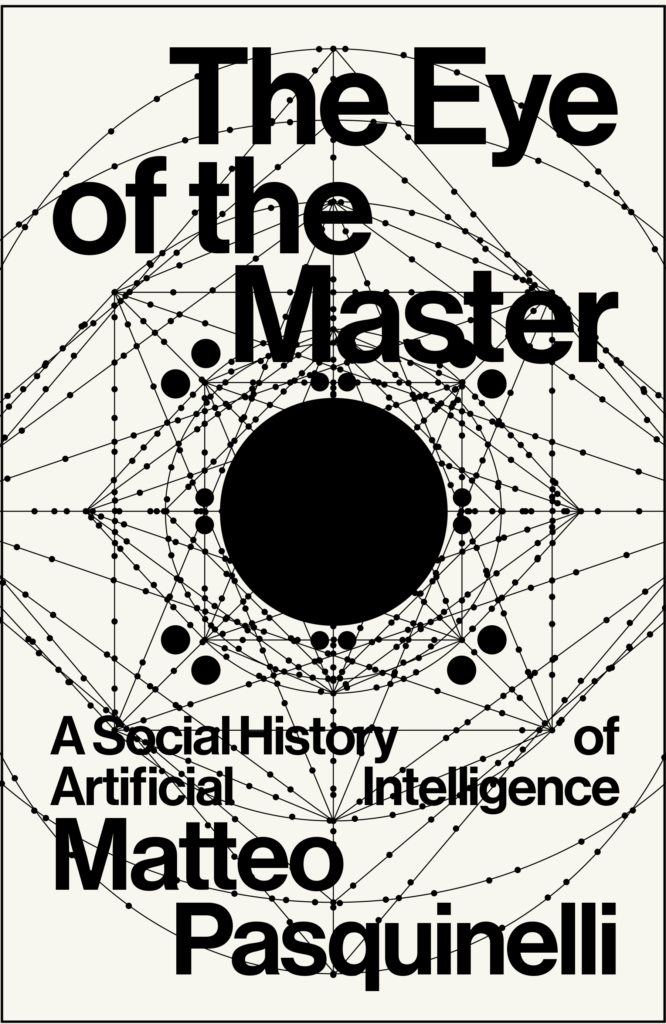
Paul Klee, Grid dance, 1935.
Matteo Pasquinelli, “Metadata Society”, keyword entry. In: Rosi Braidotti and Maria Hlavajova (eds) Posthuman Glossary, London: Bloomsbury, 2018. +PDF
Metadata Society is the name given to the technopolitical form that emerges alongside and within the network society (Castells 1996) due to the growth of corporate and state datacentres since the late 1990s. Datacentres accumulate ‘big data’—vast bodies of information about the world’s climate, stock markets, commodity supply chains, and phone communications and social networks of billions of people for example. The establishment of these large datasets as primary source of cognitive capital and political power marks the birth of the metadata society, being precisely the meta analysis of data—mapping and interpreting their patterns, trends, and forecasting their tendencies—and not their brute accumulation that makes datasets meaningful and valuable. If the network society was a “space of flows” (Castells 1996) that was based on the horizontal exchange of electronic information, datacentres incarnate the vertical accumulation of information about information, that is metadata. “Metadata represent the shift to a different and higher dimensional scale in relation to information: they disclose the collective and political nature that is intrinsic to all information” (Pasquinelli 2015). Metadata describe also the abstract coordinates of a new posthuman condition that is the matrix of dividuals that compose the superject in the society of control (Deleuze 1992).
History
The topological origin of the datacentre hegemony can be identified in specific bifurcations of the network society, in which particular nodes started to record, map or wiretap all the information exchanged through the network. As soon as the World Wide Web became a popular medium across the 1990s, the problem of its cartography was given. The cleverest solution to the navigation of the WWW came from Google’s PageRank algorithm. The first datacentre set up by Google in 1998 (known as ‘The Cage’) can be considered the milestone of the birth of the metadata society, as it was the first datacentre to start mapping the internet on a global scale via vectors of ranking. In 2013 Edward Snowden revealed NSA’s massive clandestine surveillance program PRISM to the newspaper The Guardian (Greenwald 2013), initiating a big debate on metadata surveillance (Cole 2014). Thus the period between 1998 and 2013 can be roughly identified as the consolidation of the technopolitical form of the metadata society.
Genealogy
As a symbolic form of the information society, the database is also the new form of the archive of power (yet this aspect is not apparent in Manovich 1999’s essay “Database as symbolic form”). The political space of data emerges as extension of previous institutions of knowledge and power, although now under the complex and heavy rule of information sciences and mathematics. “Datascapes” were born in the registers of the ancient archives as simple squared grids: horizontal lines with the person’s name and vertical lines carving out and ordering political data: age, gender, class, disease, crime, etc. The register’s grids expanded their territories with the bureaucracy of the modern state (Desrosières 2002). The US census in 1890, for instance, was possible thanks to the introduction of punched card by the Tabulating Machine Company (that in 1924 would change its name in International Business Machines, or IBM). The 1890 census made already clear how information technologies were contributing to processes of segmentation and racialisation of US society. After WWII the encounter of statistics with the first mainframe computers generated the database as political form.
The database depicts mathematically the formations of power that Foucault was used to record institutionally. Today the category of ‘asocial behaviour’, for instance, is computed by an algorithm in real time: there is no longer the need for a stable taxonomy codified by the disciplines of psychology or criminology. If a Foucault of the 20th century could speak the same language of the institutional archive, a Foucault of the 21st century would require a heavy technical training to access the digital one. According to such an epistemic divide, Manovich (2012) rightly identifies three “data classes”:
The explosion of data and the emergence of computational data analysis as the key scientific and economic approach in contemporary societies create new kinds of divisions. Specifically, people and organizations are divided into three categories: those who create data (both consciously and by leaving digital footprints), those who have the means to collect it, and those who have the expertise to analyze it.
Interestingly, William Gibson’s original vision of the cyberspace was also about an “infinite datascape” rather than realistic spaces of virtual reality or hypertextual networks: “A graphic representation of data abstracted from the banks of every computer in the human system. Unthinkable complexity. Lines of light ranged in the nonspace of the mind, clusters and constellations of data. Like city lights, receding” (Gibson 1984). Gibson’s intuition of the cyberspace was already about the problem of meta-navigation of vast data oceans.
Deleuze registered a similar shift, that is from Foucault’s disciplinary society based on the production of the individual to the society of control whose power would be based on “data banks” and the modulation of flows of communication.
We’re definitely moving toward “control” societies that are no longer exactly disciplinary. Foucault’s often taken as the theorist of disciplinary societies and of their principal technology, confinement (not just in hospitals and prisons, but in schools, factories, and barracks). But he was actually one of the first to say that we’re moving away from disciplinary societies, we’ve already left them behind. We’re moving toward control societies that no longer operate by confining people but through continuous control and instant communication. […] One can of course see how each kind of society corresponds to a particular kind of machine—with simple mechanical machines corresponding to sovereign societies, thermo-dynamic machines to disciplinary societies, cybernetic machines and computers to control societies. But the machines don’t explain any thing, you have to analyze the collective arrangements of which the machines are just one component. (Deleuze 1995)
In his famous “Postscript on the Societies of Control” Deleuze envision a form of power that is no longer based on the production of individuals but on the modulation of dividuals. Individuals are deconstructed into numeric footprints, or dividuals, that are administrated through “data banks”.
We no longer find ourselves dealing with the mass/individual pair. Individuals have become “dividuals”, and masses, samples, data, markets, or ”banks”. (Deleuze 1992)
The dividual mirror and follow also the idea of objectile that Deleuze discusses in The Fold (1993). The dividuals do not simply describe an atomized subject but make possible the posthuman consolidation of collective agents as condividuals, or as superjects. As Deleuze (1993: 21) says following Whitehead: “Just as the object becomes objectile, the subject becomes a superject”.[1] At least in the domain of the digital, data and metadata can be considered the dividuals that are used to compose new superjects, like when databases are used to map social patterns and forecast social trends. As Savat (2009) rightly observes, regarding the new techniques of modulation within the society of control: “the newly emerging mode of observation is pattern recognition”.
Politics
Stressing too much on the definition of control society might not leave space to political imagination and posthuman trajectories. Deleuze was wondering about the political outcomes of Foucault’s notion of biopolitics: “had he not trapped himself within the concept of power relations?” (1988: 94). As a matter of fact, the same question could be addressed back to Deleuze. The paradigm of control (as it emerged also in the Heideggerian activism of Tiqqun, for instance) can be easily transform into a paradigm of victimisation and victimizing posthumanism. As Wendy Chun recognizes:
Deleuze’s reading of control societies is persuasive, although arguably paranoid, because it accepts propaganda as technological reality, and conflates possibility with probability […]. This is not to say that Deleuze’s analysis is not correct but rather that it—like so many other analyses of technology—unintentionally fulfills the aims of control by imaginatively ascribing to control power that it does not yet have and by erasing its failures. Thus, in order to understand control-freedom, we need to insist on the failures and the actual operations of technology. We also need to understand the difference between freedom and liberty since control, though important, is only half of the story. (Chun 2008: 9)
The notion of metadata society aims to leave the potentialities open and to suggest alternative and more complex architectures of knowledge. Such infrastructures of metadata can be used against political control in a different way.[2] As Guattari wrote in his 1989 classic Cartographies Schizoanalytiques:
With the temporality put to work by microprocessors, enormous quantities of data and problems can be processed in minuscule periods of time, in such a way that the new machinic subjectivities keep on jumping ahead of the challenges and stakes with which they are confronted. (Guattari 2013: 11)
Control is not the only possible episteme of the dividual — the episteme of the posthuman condividual is yet to be invented.
Bibliography
Castells, Manuel, The Rise of the Network Society. Oxford: Blackwell, 1996.
Chun, Wendy, Control and Freedom: Power and Paranoia in the Age of Fiber Optics. MIT Press, 2008.
Cole, David, “We Kill People Based on Metadata”, The New York Review of Book, 10 May 2014.
Deleuze, Gilles. Foucault. University of Minnesota Press, 1988.
Deleuze, Gilles, The Fold: Leibniz and the Baroque, Minneapolis: University of Minnesota Press, 1993.
Deleuze, Gilles, “Postscript on the Society of Control”, October 59, 1992.
Deleuze, Gilles, “Control and becoming”, Negotiations: 1972–1990, 1995.
Desrosières, Alain, The politics of large numbers: A history of statistical reasoning, Harvard University Press, 2002.
Greenwald, Glenn, and Ewen MacAskill, “NSA Prism program taps in to user data of Apple, Google and others”, The Guardian, 7 June 2013.
Guattari, Félix. Schizoanalytic cartographies. London: Bloomsbury, 2013.
Manovich, Lev, “Trending: The Promises and the Challenges of Big Social Data”. In: Matthew K. Gold (ed.) Debates in the Digital Humanities. Minneapolis: University of Minnesota Press, 2012.
Manovich, Lev, “Database as symbolic form”. Convergence: The International Journal of Research into New Media Technologies 5.2, 1999.
Pasquinelli, Matteo, “Italian Operaismo and the Information Machine”, Theory, Culture and Society 32.3, 2015.
Savat, David, “Deleuze’s Objectile: From Discipline to Modulation.” In: Mark Poster and David Savat (eds) Deleuze and New Technology. Edinburgh: Edinburgh University Press, 2009.
[1] The terms condividual and condividuum originate from Deleuze and Guattari’s dividuals. They were first introduced and employed by the project of cultural jamming Luther Blissett in 1995. See: Marco Deseriis, Improper Names: Collective Pseudonyms from the Luddites to Anonymous, University Of Minnesota Press, 2015. For a genealogy of the concept of dividuum see also: Gerald Raunig, Dividuum: Machinic Capitalism and Molecular Revolution, Los Angeles: Semiotexte, 2016.
[2] See for instance the project PATTRN by Forensic Architecture (www.pattrn.co): “data-driven, participatory fact mapping for conflict monitoring, human rights, investigative journalism, research and analysis”.

